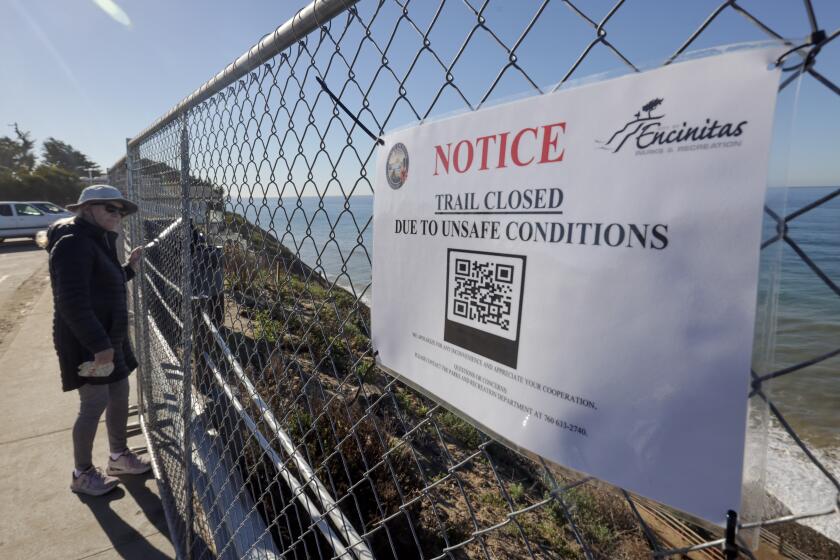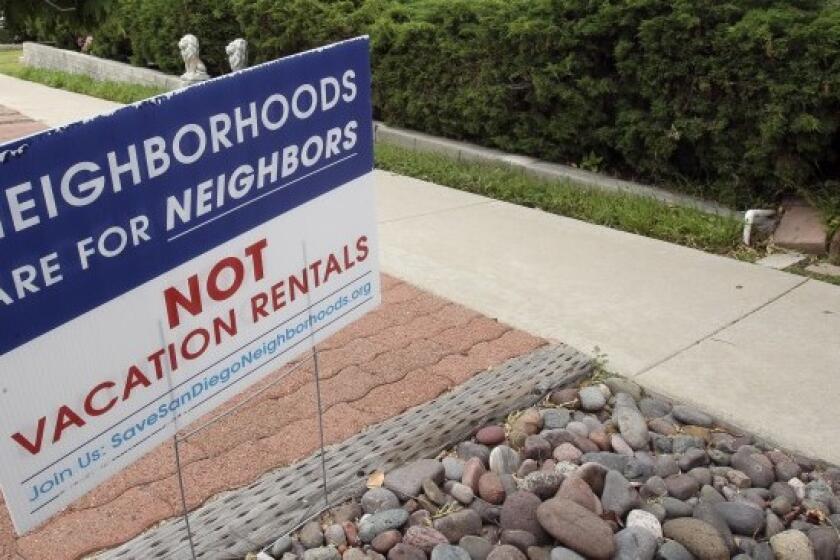Judge may allow Encinitas to adopt housing plan without voter approval
Encinitas won’t have to try again to win voter approval for a controversial, state-mandated housing planning document, but it may have to rework its failed Measure U proposal, Superior Court Judge Ronald Frazier said Wednesday.
Speaking during a court hearing attended by some 50 people, Frazier said he’s leaning toward granting the city a temporary exemption from the voting requirement mandated by a 2013 citizens’ initiative known as Proposition A. Such an exemption would allow the Encinitas City Council to directly adopt a housing plan, and thus finally come into compliance with state law after years of failing to do so.
Attorneys representing the city made a “loud and clear” argument that it would take months to get a new measure on the ballot and that new measure’s approval prospects could be dismal, Frazier said during a Wednesday afternoon court hearing regarding two lawsuits against the city. However, he said, his voting exemption would likely be a one-time thing, and only related to this particular housing plan.
Frazier’s expected to issue his final ruling Dec. 12, after both the county and the city certify the Nov. 6t election results for Measure U, which on election night was failing with 53 percent of voters saying no. On Wednesday afternoon, Frazier said he was “proceeding cautiously” and waiting on the election results certification before issuing his ruling, not because he thought the results would change but rather because the city’s housing planning effort already has been so contentious.
Encinitas currently is being sued both by the Building Industry Association of San Diego and by the housing advocacy group San Diego Tenants United over its failure to adopt a Housing Element, a state-mandated plan spelling out how a city proposes to accommodate future housing growth, particularly low-income housing. It’s the only city in the county and one of just a few in the state that lacks a current, state-certified plan. So far, the city estimates it has spent about $900,000 to fight lawsuits regarding its lack of a plan.
On Wednesday, Frazier said he was considering ordering the city to work with state officials and revise Measure U, rather than directing that Measure U be adopted outright because state officials have raised concerns with the plan.
Measure U proposes up-zoning 15 privately owned properties, allowing their owners to exceed city height limits and put 25 to 30 housing units an acre on their properties. State housing officials raised questions about some of the sites on the list, saying they may not meet the state’s standards.
Frazier’s announcement Wednesday that he might be ordering some tweaking of Measure U appeared to be unwelcome to both the city and the BIA attorneys.
Attorneys for the city had asked the judge to order Measure U’s adoption without alterations, while a BIA attorney wanted the judge to consider combining elements of Measure U and Measure T -- the city’s first housing plan ballot measure that voters rejected two years ago.
Calling Encinitas “the worst offender in the state of California” in terms of compliance with state housing law, BIA attorney Timothy Hutter said city officials know full well that the state was raising concerns about Measure U’s compliance with state law last summer and shouldn’t be arguing now for its adoption without alteration.
However, Frazier told Hutter that he wouldn’t likely grant the BIA’s request to include parts of Measure T because state law has recently changed and that plan is no longer in compliance with the law.
Speaking after Wednesday’s hearing concluded, Bruce Ehlers -- one of the leading proponents of the initiative that required voter approval for city housing plans -- said he was pleased the judge indicated that he was inclined to only lift the voting requirement temporarily.
That means future housing plans will require voter approval, he noted. The city is required to produce a new plan for the next housing cycle, which begins in 2021.
Get North County news in your inbox
Top stories from the San Diego North County every Monday, Wednesday, and Friday.
You may occasionally receive promotional content from the San Diego Union-Tribune.








